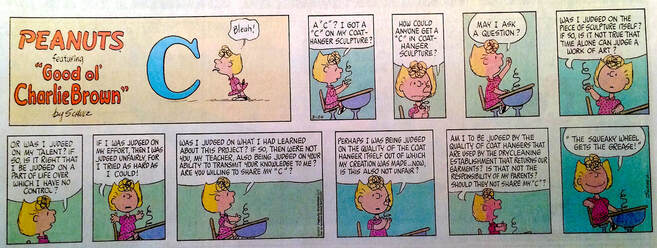Now I'm not going to just pick on the Emmys. I think that that same basic motivations, and the yearly controversies over which individuals or groups got the "correct" number of nominations in the "correct" categories is true of all the major entertainment awards. The award presentations are then followed by the yearly controversies over who was "properly" given the award after the usually rather dreary ceremonials which consist, mostly, of "I'm so surprised...." speeches which have, in most cases, been carefully written out in advance and consist mostly of "thanking" everyone in sight. Apparently, nobody is supposed to pick up on the idea that the recipient is suggesting that they had no real responsibility for the work being rewarded. Of course, given the "team" nature of theatre, television, motion pictures, etc., it is, in fact true that the best individual work is unlikely to be recognized as outstanding without appropriate support from the rest of the cast and the crew.
But we insist on having individual awards for the "BEST" this or that, despite the somewhat legendary (and seemingly quite true) situation that winning an individual award (especially for acting) may be quite damaging to one's career as it is immediately assumed that a winner will immediately demand greater payment than they would have prior to the award, making them too expensive to even consider for other work. I'm told that that isn't always the case, as even winners need/wish/want to continue working, but the belief in its truth remains.
I think one should recognize that these awards really serve, primarily, as marketing tools. Many projects are timed so that they are likely to have just been widely seen right before the nominations for the various awards are made, and so that they can enjoy an additional burst of box office sales by getting nominated, and then another such burst if the project actually gains awards. One doesn't have to be a Wharton graduate to see that being an "award-winning" anything is highly desirable from a marketing perspective.
Then, there's the problem of choosing the nominees and, ultimately, the winners. Each sort of award has its own process for accomplishing this and all seem to make efforts to be fair and open as to the methodology used. But, at least in recent years, every year there is controversy because some group expresses some dismay because THEIR group didn't get its "proper" share of nominations and/or awards. I'd suggest that this is a fundamental flaw in the basic idea of such awards and will continue until we, as a society, either 1.) accept that such activities are unlikely to be viewed as "fair" to all in every case on every occasion; or 2.) that some sort of quota system will have to be established so that the "right percentage of the "right people are assured of winning. This idea, of course, will also prove unsatisfactory to virtually everyone unless every possible category is recognized, and all quotas are fulfilled. Then we can argue about how the quotas are "unfair."
I am reminded a bit of the problem of the assignment of grades, which I see as a somewhat similarly difficult process.
Of course, there's also the question of "grade inflation", something administrators often say they deplore. Then we see things like this ad I ran across in the local paper around graduation time this year.
Creighton IS a fully accredited, nationally known university which is tied for 104th rank among "National Universities" by U.S. News. One would guess that admission is pretty competitive. So, it's not unreasonable to assume the Creighton students are more talented, dedicated, etc., than the run-of-the-mill average across the country. Given that, I would suggest that one could reasonably expect that the Creighton faculty might well expect a higher standard from their students than might be expected from those who attend Blankenty State. In fact, I would suggest that, if grades must be assigned, they, like awards, should be assigned based on the quality of the work presented given the competition present.
It's a little like the situation I observed with some frequency in the Theatre program at Western. The incoming freshman actor might have been used to playing lead roles in his/her local theatre at home, but that didn't mean that they could expect to successfully compete with more advanced students at Western immediately. Director's should cast the person they feel is the best qualified to play the role from the talent and skill level available. For those new students, the competition had changed, and they had to demonstrate that they could hold their own under these, changed circumstances. The same thing happened to our students when they graduated. The competition changed when they tried to work somewhere else (grad school or professional work), so they had to demonstrate that they could compete successfully in these new groups.
Grades are a bit like that. I would assume that a "B+" from a school like Creighton probably should suggest a higher standard of work than the same grade from, say, Western, or many other schools. Bragging that a 3.5 GPA is the "average" only suggests that our grading system is inflated because "Our" students are superior to the peons at other schools. I would argue that that also suggests a degree of arrogance which I find in poor taste and suggests a sort of complacent stupidity which I find aggravating and amusing, but all too common among college/university administrative personnel.
An example of such administrative arrogance shows up in the picture below, which I discovered on the home page of Western's website a few years back.
However, having spent a considerable time working with stage lights, I do not find the idea of showing a bare-handed technician working on obviously illuminated lighting fixtures with the suggestion that one should "Grab" a "white-hot spotlight" to suggest any real understanding of the nature of stage technology, at least at the time this picture was taken. If the line had been rewritten to say, for example: "The white-hot spotlight: Take your place in its light on stage in WCU's new School of Stage and Screen" along with a picture of someone standing onstage in a pool of light while "performing," I wouldn't have a problem with it. However, the picture is, obviously likely to appeal most to "techies" and I doubt that suggesting that lighting technicians should "grab white-hot spotlights" with their bare hands is likely to attract the sort of prospective "techies" that I would want in my program. Needless to say, my opinion regarding the use of this picture and text was not consulted before its use. I confess that I found this embarrassing, but I'm quite sure that administrative folk thought it quite clever.
As many of my students know, I was never very fond of Western's tradition of having student "awards" paralleling those used for Broadway and/or motion pictures. I don't believe that the educational experience is about awards. I believe that such things almost always degenerate into "who has the most friends" and "what category can we put 'so-and-so' in because she/he needs an award" awards. If educational theatres are going to have awards, I believe that they should be based on who has contributed the most, who has grown the most as a performer/technician/student, etc.
One of my own proudest achievements was being awarded the "Outstanding Freshman" award and then, later in my undergraduate career, a "Theatre Award Scholarship" by the Faculty of the theatre program at Indiana during my undergraduate years there, These awards weren't a plaque or trophy, just a very modest "scholarship" towards my tuition for the next year. I think, maybe it was $100. But I was singled out for "doing good" by people I respected who had the entire body of undergraduate Theatre students to pick from.
Oh, well, awards will be given, tickets will be sold based on them and people will complain about how this or that person or group was not given their "fair share" of nominations and awards. I find the whole thing a bit distasteful and further proof that most of these awards are valued, primarily, for their commercial importance. I think that's too bad. To me,
Schroeder has it right.
See you in a couple of weeks.
LLAP,
Dr. B





 RSS Feed
RSS Feed